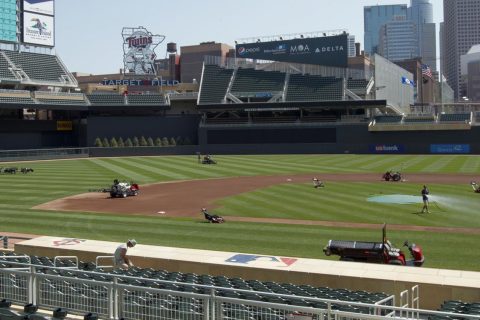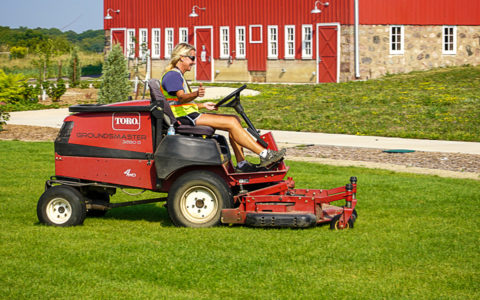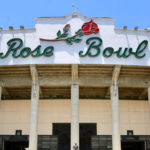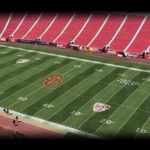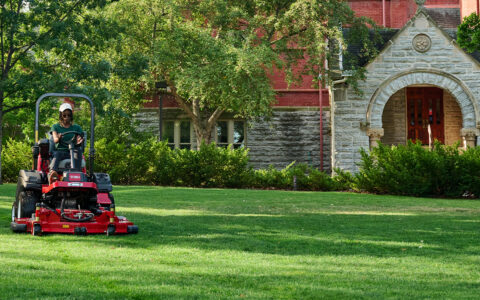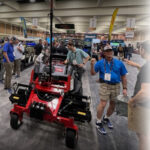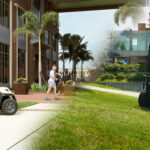Iconic Grounds: Target Field
This article is part of a series featuring premier facilities across North America that partner with Toro for equipment and support.
As spectacular as Target Field is, the most iconic thing about it may be the climate — in more ways than one. The Minneapolis home of the Minnesota Twins not only contends with the challenges of summer heat and winter cold but is also known for its environmentally responsible practices.
For this Iconic Grounds profile, we asked head groundskeeper Larry DiVito to tell us more about how climate affects Target Field.
It’s “green” year-round.
Target Field is the first sports franchise in the world to earn the U.S. Green Building Council’s LEED Gold Certification for operations and maintenance. It’s also designated as a Sports Turf Managers Association (STMA) Certified Facility for Environmentally Responsible Management.
As part of these efforts, the facility has a system that collects and recycles rainwater and irrigation water so it can be used to wash down the lower deck of the stadium. According to DiVito, this system saves about 15,000 gallons of water a night.

The weather
is always a hot topic.
From hot, humid summers to freezing, snowy winters, Target Field is no stranger
to weather extremes. Case in point: we talked with DiVito on a February
afternoon when the high temperature in Minneapolis was -4˚F — and during that
conversation, he recalled one August double-header when he was interviewed by
The Weather Channel because the heat index was 114˚F.
Weather is such an important factor, the stadium brings a meteorologist on site to monitor conditions on game days. “The most critical time is an hour before the game,” DiVito explains. “We’ve got to decide: Can we play five or six innings? Because we don’t want the starting pitchers to warm up unless they’re actually going to pitch for a couple hours.” The weather doesn’t just impact players, either. The team in charge of concessions and food service also needs to know about weather delays so they can make decisions to minimize waste.
What
happens in the offseason makes a difference.
“From May 1 to Labor Day, my job’s not that different from other northern Major
League cities like Chicago, Cleveland, Detroit or Boston,” DiVito says. “It’s
more on the front and back end — how you get the field ready for opening day
and how you prepare it for winter so it comes out in good condition.”
For DiVito, that starts with planning. From late September to early November, he has a program to lightly feed the grass and apply fungicides to anticipate snow mold pressure leading into winter. Then his crew applies double topdressing to help insulate the plant and puts lightweight, breathable agricultural blankets on the field as a buffer in the absence of snow cover.
Over the winter, the crew also monitors for ice. If there’s significant ice for a prolonged period of time, they have to decide whether to turn on the field heating system.
In the spring, their first move is to clear snow. Depending on how deep it is, they may use the heating system to gradually melt it or clear it with their Groundsmaster® 360, which is configured as a snow-only unit. They can also attach a plow to one of their Sand Pro® groomers. Both machines have a relatively lightweight footprint, which is important on a sand-based natural grass field. “We’re expected to be 100% game-ready the first week of April, so we’re not bringing heavy equipment out there to move snow around,” DiVito notes.
It takes a
diverse fleet. And the right support.
In addition to the Groundsmaster 360 and three Sand Pro groomers, Target
Field’s Toro fleet includes a Reelmaster® 5210 outfield mower,
several Greensmaster® walk mowers, a Multi Pro® sprayer
and a GreensPro® roller. They also have a ProCore® 648
aerator, a Pro Sweep® attachment and a Topdresser 1800, as well as
diesel, gas and electric Workman® utility vehicles and a Pro Force®
debris blower (which they connect to pipes under the field so they can blow air
into the tarps to shed water after a light rain).

“Going into winter, the most valuable piece of Toro equipment we have is our Multi Pro sprayer,” DiVito says. “It’s not a case of just putting one granular application out on October first and that’s it. I’m really micromanaging the application. We can be spraying once a week at specific quantities of nitrogen and micronutrients, and applying fungicide as well — so having the sprayer dialed in is really critical.”
That’s where DiVito says his local Toro distributor, MTI Distributing, has been important. “The relationship with MTI has been a huge benefit for us — having that sprayer work done in the offseason, having it calibrated, and knowing that if something goes wrong they’re able to address it quickly … either over the phone or by having a mobile tech come out the next day.”
The stadium has a maintenance contract with MTI, which DiVito justifies because he doesn’t have to hire a technician. “That includes basic equipment checks and changing the oil, but if they’re coming that week and I have a specific question I’m trying to get my head around, I also know that face-to-face discussion can solve a lot of problems,” he says.
They’re
still busy, but it’s a bit different.
The Target Field grounds crew includes four year-round positions. Four
additional employees join the crew from March through early November.
Although the field’s maintenance requirements haven’t changed during the COVID-19 crisis, the crew has had to make a few adjustments. Social distancing isn’t difficult with much of the outdoor work, but the crew has been divided into groups with separate locker, meal and office areas to maintain a backup if an employee has to quarantine.

In a typical year, the crew would have to schedule around a number of special events and concerts, but those were suspended in 2020 because of the pandemic. Still, the shortened MLB season kept DiVito and his crew busy. “Other than April and May, it was a fairly normal year, baseball-wise,” he says. He anticipates the coming season to look a bit different with the possible return of fans to the stadium this spring.
Watch for more Iconic Grounds profiles.
Curious where our next Iconic Grounds article will take us?
Follow @ToroGrounds on
Twitter for updates and look for the next issue of Grounds For Success.
MLB is a registered trademark of Major League Baseball. Team names are registered trademarks of the teams indicated.
